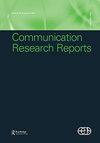Trait argumentativeness as a correlate of bolster and counterargue tendencies in resistance to persuasion research
IF 1.6
Q2 COMMUNICATION
引用次数: 1
Abstract
ABSTRACT Research on resistance to persuasion has examined a number of relevant variables such as one’s bolstering of one’s own argument and, for example, generating counterarguments in order to resist a persuasive message. Is resistance to persuasion a function of a widespread practice of bolstering and/or counterarguing? Or, is resistance to persuasion more meaningfully examined from an individual differences approach based on relative levels of trait argumentativeness within samples? Three hypotheses were offered and tested. Results suggested that empirical investigations of the relationship of bolstering arguments and generating counterarguments to resistance to persuasion should report argumentativeness levels of research participants. Trait argumentativeness may have a very substantial role in the effect sizes reported in resistance to persuasion research. High argumentatives significantly preferred counterarguing over bolstering in resistance to persuasion whereas low argumentatives significantly preferred bolstering over counterarguing, suggesting a root difference between high and low argumentatives requiring further investigation for verification.特质辩论性与抗拒说服研究中的支持和反对倾向的相关性
抵制说服的研究考察了一些相关的变量,例如一个人支持自己的论点,例如,为了抵制有说服力的信息而产生反论点。对说服的抵制是支持和/或反驳的普遍做法的结果吗?或者,对说服的抗拒是否更有意义,从基于样本中相对水平的特质争论性的个体差异方法来检验?提出并验证了三个假设。结果表明,实证研究支持论点和产生反论点与抵制说服的关系应该报告研究参与者的争论水平。在抗说服研究中,争论性特质可能在效应大小中扮演着非常重要的角色。高论证者在抵抗说服时明显倾向于反驳而不是支持,而低论证者明显倾向于支持而不是反驳,这表明高论证和低论证之间存在根本差异,需要进一步调查验证。
本文章由计算机程序翻译,如有差异,请以英文原文为准。
求助全文
约1分钟内获得全文
求助全文

 求助内容:
求助内容: 应助结果提醒方式:
应助结果提醒方式:


